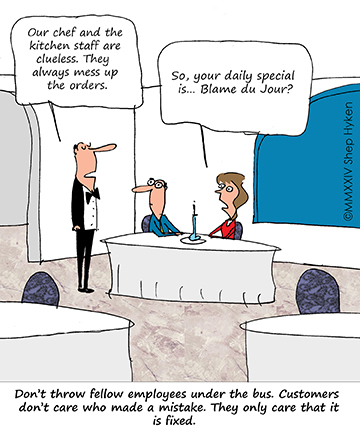I couldn’t hold back. I told an employee to stop complaining about her fellow employees in front of us, her customers. Here’s the story.

My wife and I were at a restaurant. The server seemed pleasant and professional, but as our food was delivered, we saw a different side of her. There was a mistake in the order. The side dishes we received were not the ones we chose. I didn’t think it would be a big deal. She could either take our meals back to the kitchen or let us keep our meals and bring out the side dishes we ordered. But to the server, it was a big deal.
She started to complain about how this happens “all the time.” She said, “The people in the kitchen don’t read the orders properly. They don’t know what they are doing back there.” She said a few other words that insulted her coworkers, but I stopped her and said as nicely as I could, “I’m sorry you’re frustrated with the team in the kitchen, but you really shouldn’t complain about them to us.”
Customer service is a team sport. There are others who support you and those whom you support. Sometimes, things go wrong, and they need to be fixed. Often, the person the customer is talking to isn’t at fault, but that doesn’t mean they can’t own some responsibility and represent the company and its employees in the best light.
I thought about how a company can avoid an employee “throwing other employees under the bus” and came up with a number of ideas to mitigate or eliminate this from happening. Here are three of them to get you thinking:
- Emphasize the Team: Encourage employees to use the word “we” instead of “they.” The right vocabulary can support the idea of a team effort in taking care of customers.
- Teach Accountability: It may not be an employee’s fault, but it is now their opportunity to fix the problem. Think about the last time you called a company’s customer support number with a complaint and it was handled perfectly. It wasn’t the customer support agent’s fault, but they owned the problem and solved it.
- Recognize Employees Who Support the Company and Employees When Mistakes Are Made: Praise employees who handle mistakes properly and uphold the dignity of their coworkers in front of customers. You can use the example for both recognition and a teaching opportunity for others.
When mistakes occur in the workplace, especially in customer-facing roles, the manner in which employees manage these situations can impact a customer’s perception of the business. Everyone must remember their Awesome Responsibility, which is that at any given time, one employee interacting with a customer represents all other employees.


